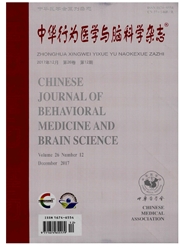

 中文摘要:
中文摘要:
目的 本研究旨在评价铝接触对作业工人心血管自主神经功能的影响。方法 采用Ewing DJ推荐的自主神经功能测试组合对32名铝电解工人和34名正常对照工人进行了测试,测试项目共包括四项内容:Valsalva Manoeuvre心率反应(HR—V)、深呼吸时的心率变化(HR—DB)、即立心率反应(HR-IS)和即立血压反应(BP—IS)。结果 铝电解工人的尿铝值(40.08±9.36μg/mg肌酐)明显高于对照组,即立时R—R变化能力Rmax:min(1.21±0.18)、即立血压反应BP—Is(6.56±4.91)均明显低于对照组。多元逐步回归分析表明年龄、接触铝的年数、饮酒、受教育年数从不同方面影响心率和血压变化。结论 铝电解作业工人的心血管交感神经和副交感神终调节功能降低,心血管自主神终功能系统是铝损害的一个靶系统。
 英文摘要:
英文摘要:
Objective To evaluate the adverse effect of aluminum-exposure on workers' cardiovascular autonomic nervous system. Methods Autonomic nervous system function test battery recommended by Ewing DJ was conducted on 32 aluminum-exposed workers selected from a aluminum electrolysis plant and 34 healthy reference people come from a flour factory. Results Urine A1 concentration in aluminum electrolysis workers (40.08 ± 9.36 μg/mg ereatinine) was significantly higher than that of control group. Rmax : min ( 1.21 ± 0.18 ) and BP-IS (6.56 ± 4.91 )decreased in aluminum-exposed group compared with those of control group. Multiply regression a- nalysis indicated that age, aluminum-exposure duration, alcohol drinking and education duration affect heart rate and blood pressure. Conclusion Aluminum may have adverse effect to sympathetic as well as parasympathetic nervous system. Cardiovascular autonomic nervous system is likely a target system of aluminum detriment.
 同期刊论文项目
同期刊论文项目
 同项目期刊论文
同项目期刊论文
 期刊信息
期刊信息
